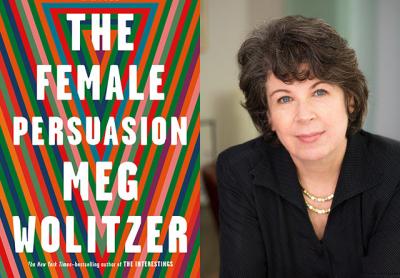Power Struggles

“The Female Persuasion”
Meg Wolitzer
Riverhead Books, $28
I wish a male reviewer had been assigned Meg Wolitzer’s timely and clever new novel, “The Female Persuasion.” It could have been an edifying exercise in literary biases, since Ms. Wolitzer has too often been labeled a writer of “women’s fiction.” That is to say, her stories vibrate with nuanced insights and observations, mostly about relationships between parents and children, husbands and wives, men and women, women and women. Or, as V.S. Naipaul, the Nobel laureate, called it, “all that feminine tosh.”
Ms. Wolitzer wrote a scathing New York Times essay in 2012 titled “The Second Shelf,” about the different literary rules for men and women, which relegate her “to that close-quartered lower shelf where books emphasizing relationships and the interior lives of women are often relegated,” while elevating the Franzens and Eugenideses, now writing about the same subject matter, to the singularly highbrow literary shelf.
Indeed, on Amazon, a search for Meg Wolitzer will take you to the “women’s fiction” category, and to some place even more minimizing: “women’s domestic life fiction.” Yet Tom Perrotta’s excellent but decidedly domesticated “Mrs. Fletcher,” about a single mother’s relationship with her college-bound son, is simply listed on Amazon as “contemporary fiction.”
That said, even for the sake of a worthy experiment, I’m not sure I would have relinquished the opportunity to read a Wolitzer novel in advance of its release date. Since discovering her brilliant 2003 book, “The Wife,” about a woman who curbs her own talents for the benefit and glory of her Nobel Prize-winning author husband, I have fallen greedily upon every new novel she publishes. There was the 2005 sharp-tongued, family tragicomedy, “The Position,” about four siblings who discover that their parents had once published a “Joy of Sex”-like manual, complete with illustrations of easy-to-recognize Mom and Dad; “The Ten-Year Nap” in 2008, a stay-at-home mama drama about four New York mothers emerging from a decade in babyland; “The Uncoupling” in 2011, in which a debilitating spell falls over the women of a suburban town and saps them, en masse, of their libido, and “The Interestings” in 2013, a sweeping narrative that follows a group of friends who meet at an arts camp in the ’70s and age into midlife and beyond.
“The Female Persuasion,” the author’s 10th adult novel, will be in bookstores on Tuesday. Read in our often bewildering #MeToo world, it’s an almost prophetic tale of gender and power. But framing and shaping this story, as is the case in most Wolitzer books, is a sustained inquiry into relationships.
The book begins with Greer Kadetsky, a college freshman and bright go-getter who, because of her disengaged, pot-addled parents, ends up in unheard of Ryland College, rather than Yale, where she had been accepted. But at Ryland her life changes, possibly in ways that it would not have at Yale. At a frat party one night, she is groped by a male student, who does that and far worse to other female students and gets away with it, propelling Greer into activism and championing female causes.
Also at Ryland, she encounters 63-year-old Faith Frank, “a couple of steps down from Gloria Steinem in fame,” who later becomes Greer’s employer and mentor, a relationship that offers a gimlet-eye view of how women of different ages continue to wrestle with feminism in the modern era. Then there’s Cory Pinto, Greer’s high school sweetheart, “twin rocket ships,” as they are called, since they are the only two at their suburban school earmarked for the Ivies. While Greer’s trajectory is blighted, Cory goes to Princeton, and the two stay more or less committed to each other, with the goal of sharing an apartment in Brooklyn after college.
There is nothing seriously the matter with any of them. But then come life’s bumps and a seismic event in Cory’s life, sending the twin rocket ships on divergent courses. Greer’s parallel universe of the Faith Frank women’s foundation where she works unravels at the hands of a rich white man.
As Ms. Wolitzer delineates these fracturing lives, in her pleasant, no-frills style, she pursues convincing inquiries into deeper, more nuanced relationships within the story. Beautifully developed and complex commentaries on what parents owe children, and how much children often feel they owe their parents; the increasingly unrealistic expectations society has come to place on an Ivy League education (Ms. Wolitzer teaches creative writing at the Southampton campus of Stony Brook University); the friction between magnanimous corporate America and idealistic women, and the reckoning between the original feminists and the daughters of sexual liberation, the slightly entitled second-wave feminists.
Here’s an example of Ms. Wolitzer’s generosity, nuance with her characters, and insight:
“Faith stood beside Greer over the deep stainless-steel sink, where she ran a thudding flow of cold water down upon the bloody thumb and then dried it. . . . The light touch of this powerful woman was profound. So too was her choice to use her power in this tender way. Maybe that’s what we want from women, Greer thought as her thumb pulsed and percolated with blood. Maybe that’s what we imagine it would be like to have a woman lead us. When women got into positions of power, they calibrated and recalibrated tenderness and strength, modulating and correcting. Power and love didn’t often live side by side. If one came in, the other might go.”
It’s feminine tosh all right, but being rescued for contemporary literature. I wonder if men would agree.
Meg Wolitzer lives in Manhattan. For many years she was a visitor to Springs, where her parents had a house.
